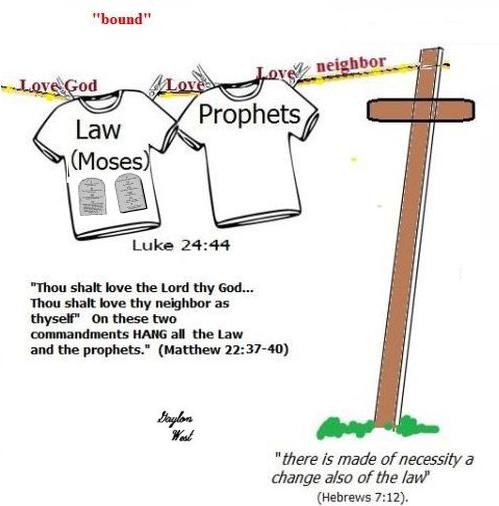
|
 |
series"MARRIAGE ON THE MOUNTAIN":
| RECAP:
Jesus was born under the Law of Moses (Galatians 4:4). He died under the Law of Moses (Hebrews 9:15-17). His New Covenant came into effect after His death on the cross. In the sermon on the mount, Jesus declared that His teaching did not oppose or destroy the Law of Moses and the Prophets (Matthew 5:18,19). "Think not that I am come to destroy the Law [of Moses], or the prophets... Whosoever therefore shall break one of these least commandments, and SHALL TEACH MEN SO, he shall be called the least in the kingdom of heaven" (Matthew 5:17-19). Jesus was speaking of the Law of Moses. Not only should one live the Law of Moses but he must teach it. Note: until the Law was changed. The Law was NOT changed during Jesus' lifetime on earth (Colossians 2:14-17; Hebrews 9:15). To teach contrary to the Law of Moses meant the punishment of death (Deuteronomy 13:5). Jesus taught submission to the Law and obeyed Himself the Law of Moses perfectly; i.e., He did not sin (Hebrews 4:15). "Though he were a Son, yet learned he obedience by the things which he suffered," (Hebrews 5:8). Even, to the death on the cross. |
JESUS, DIVORCE AND THE PHARISEES
"When a man hath taken a wife, and married her, and it come to pass that she find no favour in his eyes, because he hath found some uncleanness in her: then let him write her a bill of divorcement, and give [it] in her hand, and send her out of his house" (Deuteronomy 24:1).
Moses required three steps if a wife had lost her husband's favor in ending the unsatisfactory marriage scripturally. The woman has "no favor (grace) in the eyes of her husband." Why? Hillel and the Pharisees were wrong. It was not that the man did not "love" her anymore and he could "kick the woman" out of his house. (1) The woman must have fallen out of grace with him because of conduct of 'ervah unclean thingi; (2) the man has to write the spouse a bill of divorcement and has to give it into her hand (3) the man now sends her out of his house. In the original language the steps are conditional to one another. All of the steps are dependent upon the woman's action of uncleanness. Once the man determines she has no favor based upon her "uncleanness", then he is required to follow the steps.

THE PHARISEES' CONFUSION
The contradictions in an "oral tradition." I call this a "confusion" to emphasize that the leaders themselves could not agree on what the "oral tradition" (on Deuteronomy 24) was supposed to be. This would be laughable if it were not so serious.
The Pharisees venerated their "oral teachings" that they claimed were "handed down from Moses" (that was supposed to "explain" the written Law). It is ironic that they could not agree on what that the oral teachings was supposed to be in explaining Deuteronomy 24:1-3. This exposes as a lie, that there were no oral traditions handed down; for if there had been, then the sages would not have to decide together what it was supposed to be. In addition, this was 1500 years or so after Moses. How could an oral tradition be handed down intact from its source? Have you ever played the game "gossip"? And yet this was determined to be dominant in authority over the inspired written Word of God. This should prove once and for all that the "Oral Traditions" were nothing more than man-made teachings.
During the first century, the divorce issue (oral tradition) was a chief dispute between two major schools. The Shammai version restricted divorce to include such things as unchastity which the Law had actually specified as capital offenses. On the other hand, the Hillel version was that a husband could divorce his wife for any cause. That was probably why the question was posed later to Jesus as it was in Matthew 19. Divorce for any cause? The Hillel position had been around since the birth of Jesus. It was "an oral teaching" that the husband could divorce for any cause. Josephus, the Jewish historian who wrote in the first century, says that Hillel even "divorced his wife because he was not pleased with her manners." Apparently the "oral tradition" for the Sanhedrin leader was born from convenience for him. Hillel's philosophy among the Pharisees had influenced the populace. If the wife looks cross-eyed, (to be crude), the rule was "kick her out of the house." Josephus, by the way, abscribed to this view as well.
Meanwhile the Jews had been influenced by their Greek and Roman pagan neighbors. Roman society were easily divorcing one another without cause as well as without a bill of divorce. The first century Jewish historian Josephus describes the free divorcing going on. In addition, the Romans as the civilizations before them, did not require a legal divorce or the writing of a bill of divorcement. The question before the Jews would be then (1) do I have to have a reason for divorce and (2) do I have to go through the trouble of divorcing my wife before the Jewish courts? After all, my Gentile neighbors don't have to go through an expensive and troublesome route.
Jesus says, "It hath been said, Whosoever shall put away his wife, let him give her a writing of divorcement" (Matthew 5:31). This sounds like Moses? What's wrong? What is missing here? Certainly, the required Scriptural cause of uncleanness is missing. This is consistent with how Jesus dealt with the other errors that the populace had been taught by the scribes and Pharisees.
A chief interpretation of Jesus' remark here is that one putting out his wife without the bill of divorcement is causing her to commit adultery. If the husband hadn't given the required bill of divorcement, it is true that the marriage would not have been terminated. She was still married to him. Whoever married her would actually be committing adultery with someone else's wife. That's the definition of the word "adultery." Hence, we would expect Jesus to follow this with the active voice of committing adultery. However, this did not happen.
Jesus does say "one putting away his wife" when He asserts His authority and does skip mentioning again the step of the bill in his statement. Is Jesus then addressing the Greek and Roman practice?
If Jesus were addressing an absence of a certificate... The remedy in such a case would be to get a legal divorce. According to my research there's evidence that Philip had not given Herodias a bill of divorce. Philip had not even "put her away." She left him for his brother Herod. Herodias is specifically said to still be Herod's "brother Philip's wife" (Matthew 14:3). The marriage had not been terminated by Moses' Law. Herod therefore, just as John the Baptist said proclaimed, was violating the incest laws of Leviticus 18. She was still legally married to Philip. Josephus mentions that she had divorced herself from her husband. But as this contemporary historian points out, this was against "the laws of our country."ii Josephus' country was the Jewish nation. He was referring to at least the Law of Moses in that statement.
However, for consistency with His other statements in the sermon, I must disagree that Jesus was dealing with the bill of divorce. He says they had heard (the Pharisees' teaching) "give a writing of a bill of divorcement." He has no quarrel with the Pharisees teaching this. He has to be dealing with Hillel's "oral tradition" interpretation of divorce for "any cause" (the Pharisees tempted Jesus with this same phrase "any cause" in Matthew 19).
Jesus Asserts the Need for Biblical Cause
Now the pattern in the sermon on the mount is that Jesus corrects the "heart of the matter" factors with the false teachings of the Pharisees. For example, it wasn't just not committing adultery that made a person right in the sight of God, but his not having the lust from the heart for a married woman. Would it not be consistent then for Jesus to correct their teaching of divorce for "any cause." He points out that there has to be a Scriptural cause as well as a writing of a bill of divorcement. If there's no legitimate cause, why divorce and cause treachery to one's wife? Would this not match the prophet's condemnation in Malachi 2:16? “If he hates and divorces his wife,” says the LORD God of Israel, “he covers his garment with injustice,” says the LORD of Hosts. Therefore, watch yourselves carefully, and do not act treacherously." See VIII.2 MALACHI 2 MISINTERPRETED.
Spiros Zodhiates, Greek-American Bible scholar, published The Hebrew-Greek KeyWord Study Bible which indexes key terms in the English Bible with the words they were translated from in the original languages. He comments that the Lord agreed with Moses that a bill of divorcement should be given, "but Christ did not leave the matter there. He castigated the evil of divorcing one's wife for no valid reason."iii
The Law of the Lord through Moses (Luke 2:23) commanded a bill of divorcement be given only for the cause of an "unclean thing" in Deuteronomy 24:1. In Matthew 5, Jesus said, give a bill of divorcement only for fornication. Jesus says that adultery would be a consequence from divorcing for just "any cause" as taught by Hillel and the Pharisees.
Did Jesus Change the Law of the Lord Given Through Moses? There is no indication that the scribes, Pharisees or the people interpreted Jesus' remarks as denying or changing the laws of Moses in any of His remarks in the sermon on the mount. This would have caused Jesus to sin and be subject, as a false prophet, to be killed (Deuteronomy 13:5). This would certainly include His remarks on marriage and divorce in Matthew 19. To accentuate this, no witnesses came forward before Annas and Caiaphas during the upcoming trials of Jesus claiming that Jesus was trying to change Moses. There were attempts at false witnessing but this was never even considered in the Sanhedrin trials.
To the contrary, Jesus insists that the people repent and obey the Law of the Lord through Moses, e.g., Matthew 23:3. This was NEVER contested in the first century by anybody. They must follow Deuteronomy 24:1ff in the legal divorcing. But Jesus emphasized in the sermon on the mount that a certificate could not in and of itself make a divorce correct before God. It had to also be for the Scriptural cause which Jesus called "fornication."
Gaylon West
"Throw Out the Lifeline"
http://www.biblestudylessons.net
[book: Marriage Made From Heaven, by Gaylon West]
You may also be interested in the previous articles:
"God's Marriage Laws Through the Ages"
"God's Clothes Line: Jesus and the Pharisees"
"Did Jesus Teach the Commands of Moses?"
See "MARRIAGE ON THE MOUNTAIN":
i This unclean thing is Hebrew ervah (nakedness) and not the ceremonial unclean tame which contrasted profane things from holy.
ii http://en.wikipedia.org/wiki/Herodias#cite_note-gutenberg.org-5
iii What About Divorce? by Spiros Zodhiates, TH.,D, AMG publishers: Chattanooga, TN 37422, pages 77,78 Copyright © 1984, 2000, quoted by
http://www.brutallyhonest.org/brutally_honest/files/Biblical Misconceptions About Divorce and Remarriage.pdf